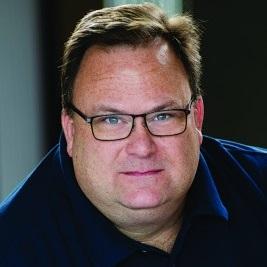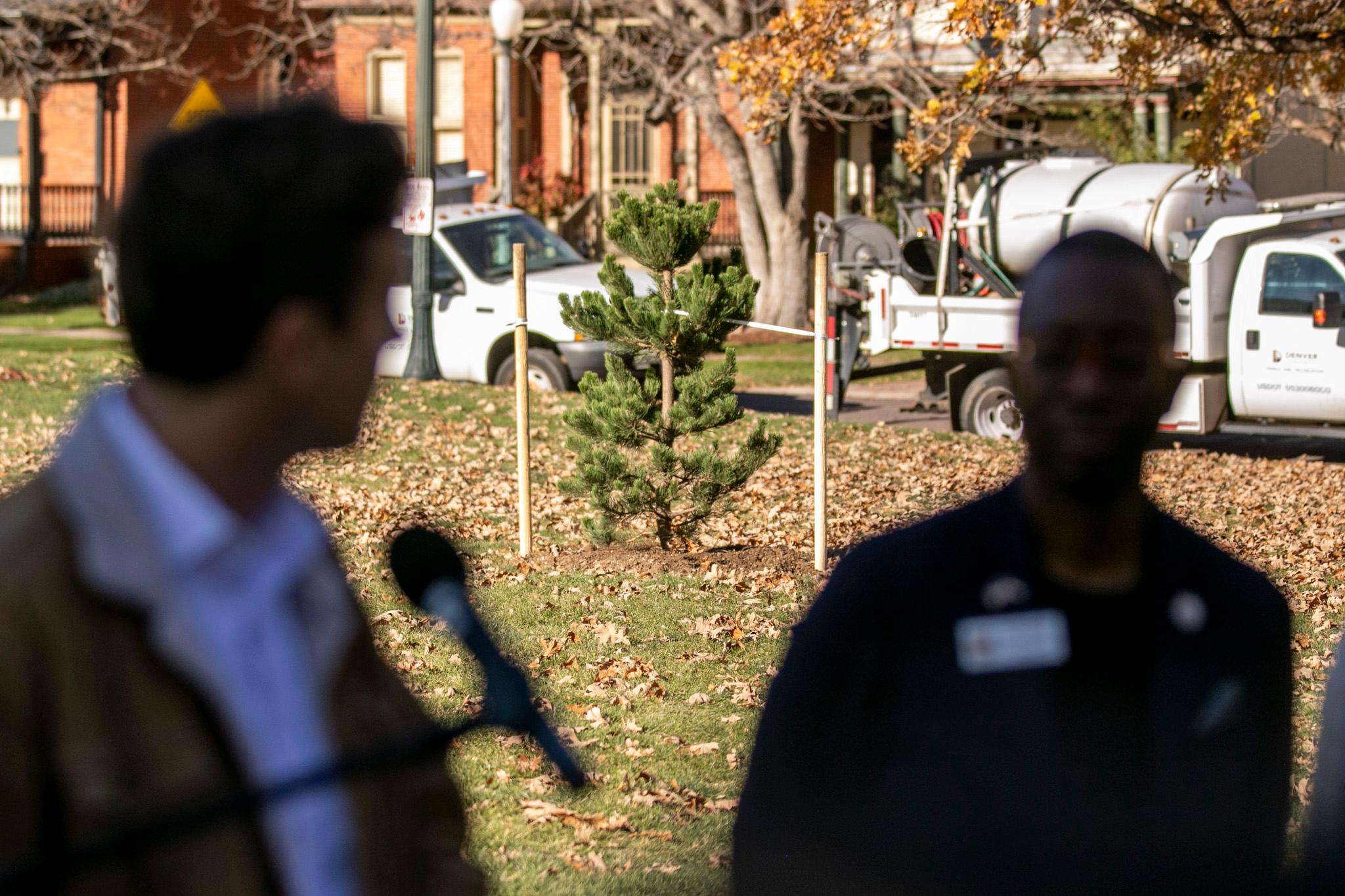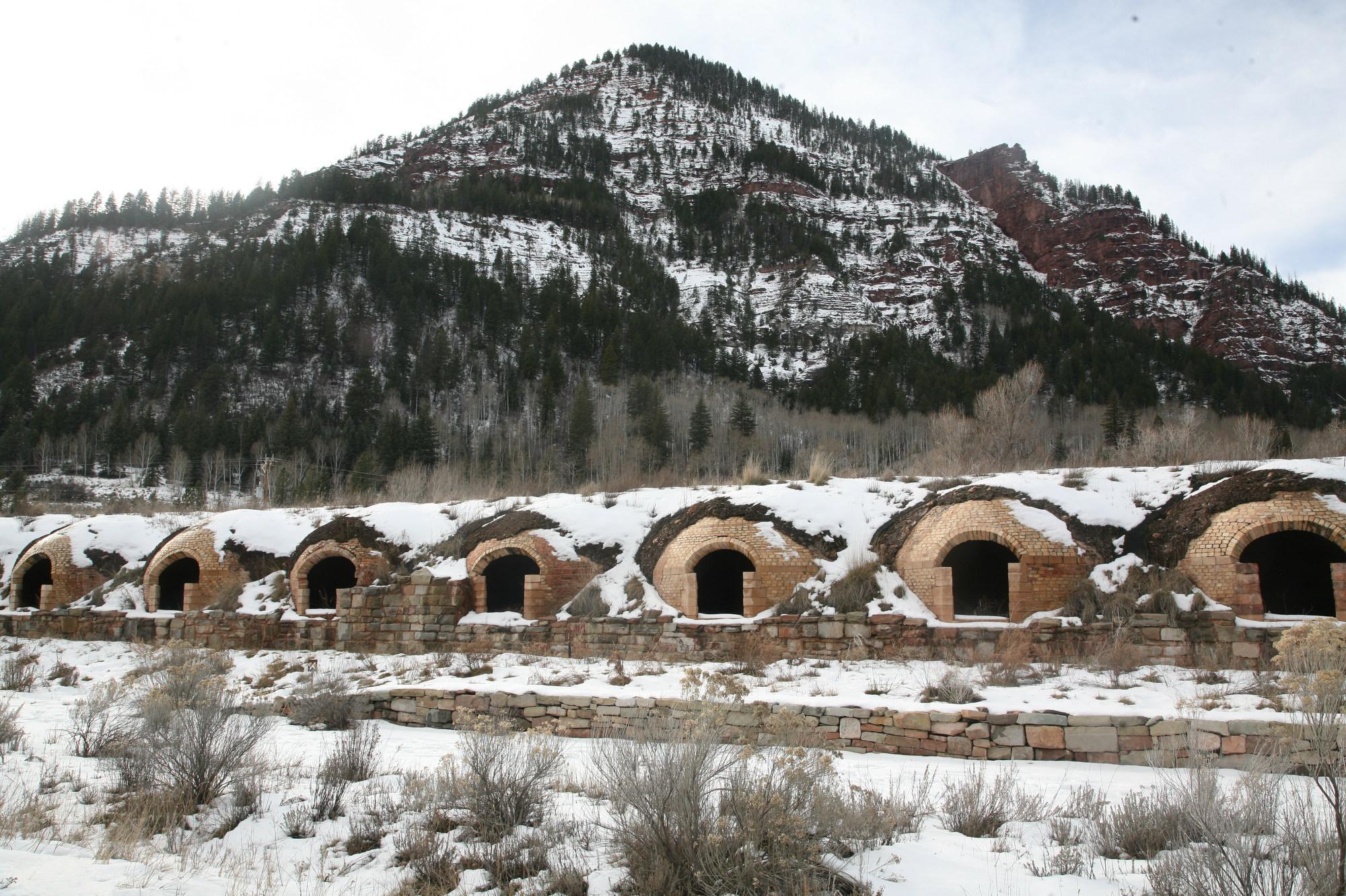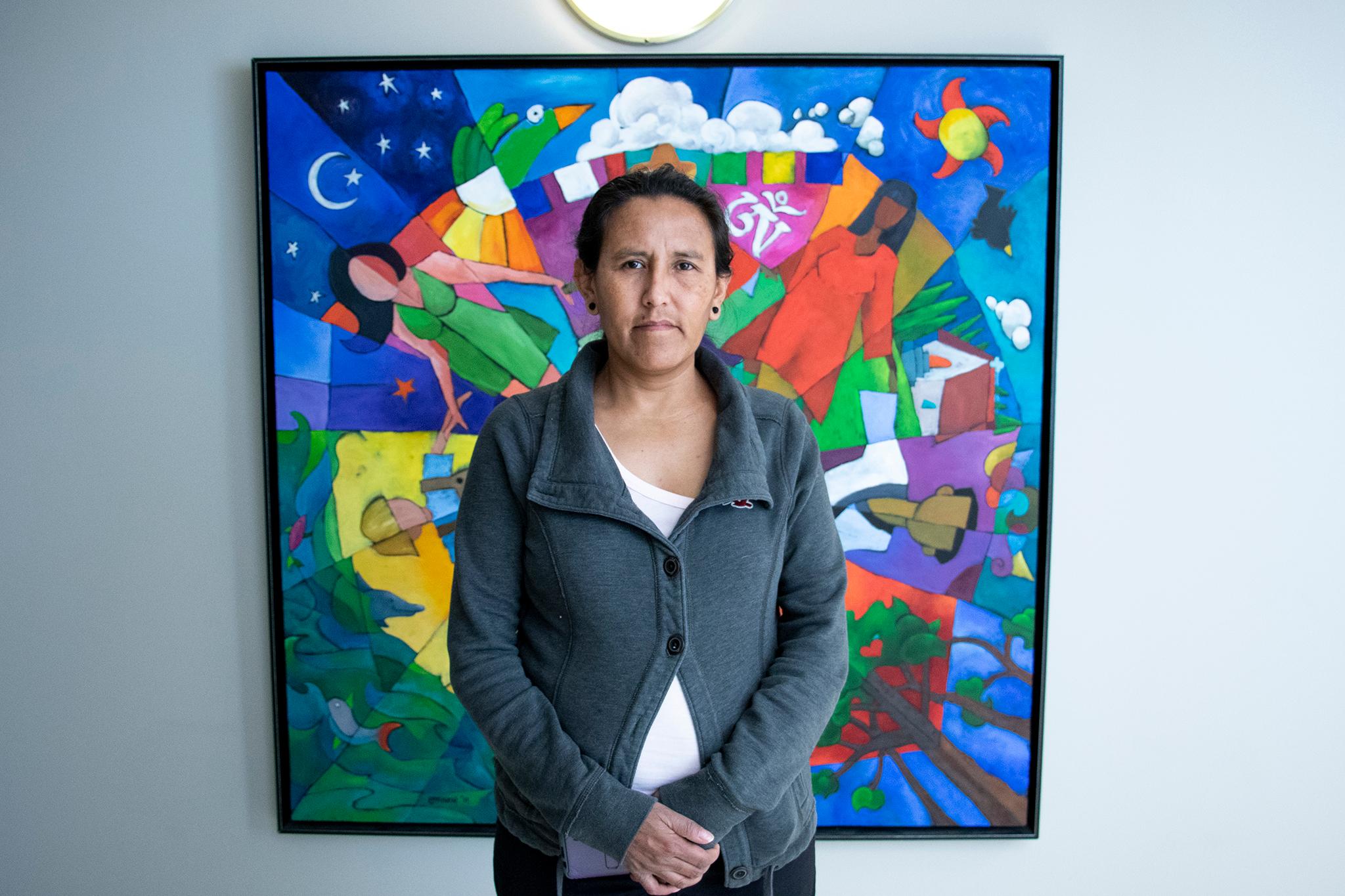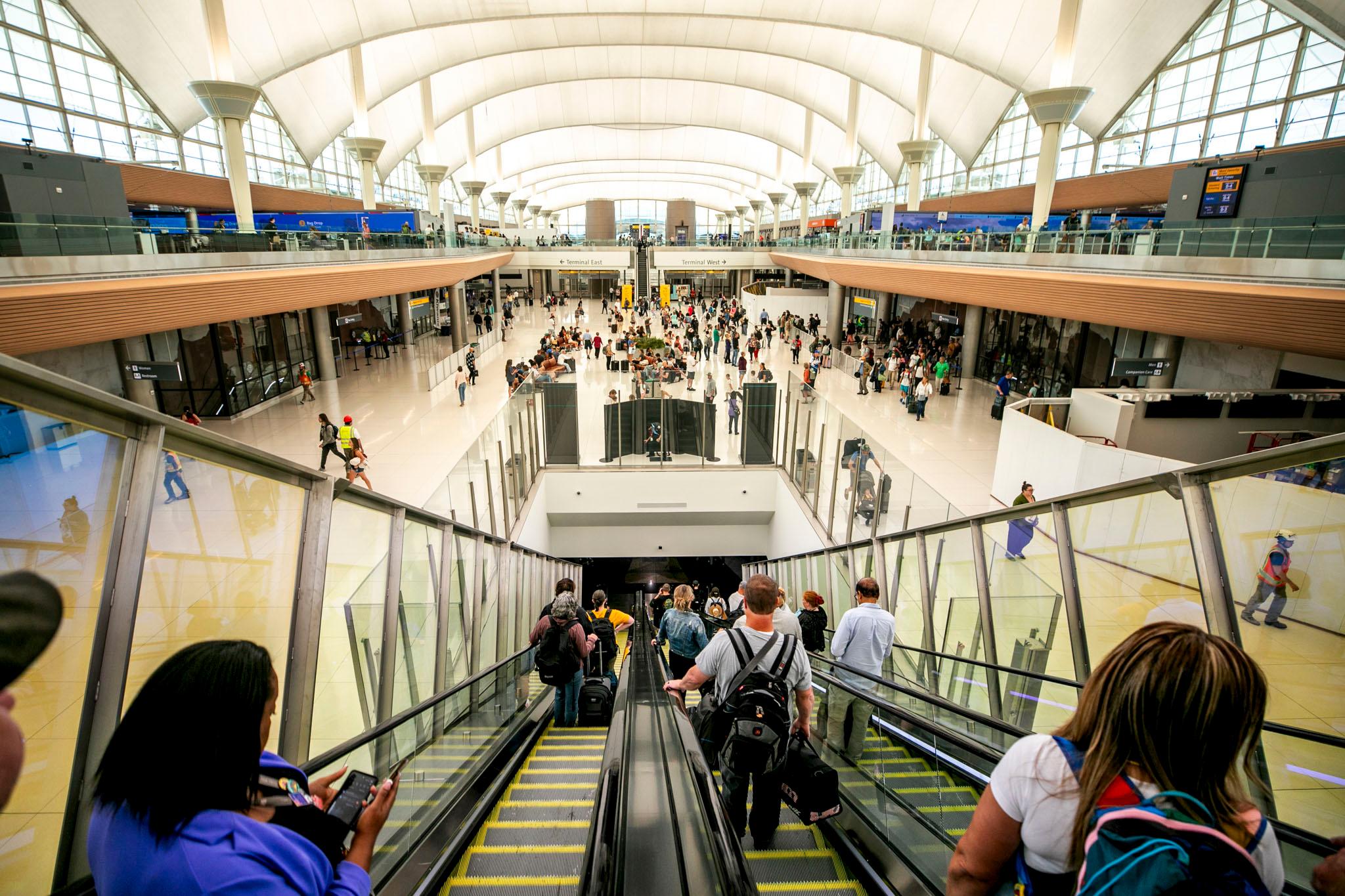
The winter holidays are a busy time of year at Denver International Airport. By Sunday, Dec. 29, an estimated 811,000 people will have traveled through the airport. And DIA’s CEO says the airport is ready to handle the crowds.
Phil Washington also says this may be the last winter holiday season when travelers have to deal with obvious, and long-standing, construction inconveniences.
“We recognize that there might be some construction fatigue out there, but we're winding down that customer-facing construction impact, and we're very, very happy for that,” Washington told Colorado Matters senior host Ryan Warner. “We will begin to (share on social media) in the first quarter of next year what the entire Great Hall, the terminal, will look like when complete, and I think people will be very, very pleased. (It’s) a Colorado-centric terminal with entertainment, with top-end concessions. But we are winding this thing down.”
In a live interview on Colorado Matters, Washington also answered questions about plans to handle increased traffic on Peña Boulevard, changes to airport security checkpoints, new service to international destinations, alternatives to the underground passenger trains and working with the incoming presidential administration.
This interview has been edited for length and clarity.
Ryan Warner: This is interesting to me. The busiest day in your airport's history was July 7th. I think that was a Sunday. Presumably, everyone was coming home from Independence Day vacation. Do you expect to break that over the winter holidays?
Phil Washington: We might. We might. But 93,000 people is a lot of folks. I'm happy that we were able to process them so efficiently even on that day, July 7th. So we'll see. But regardless of how many come through, we'll be ready.
Warner: There is no more bridge security, that is a TSA checkpoint on the bridge between the terminal and the A concourse. Phil, that was often my escape from the maddening crowd. Why close a security option in an ever-growing airport?
Washington: We closed the A bridge for primarily two reasons. One, we wanted to turn it over sooner to our builders, because keep in mind, when we open up the new East security checkpoint, people will be able to go through the new East and West security and stay in a sterile environment and walk right across the A bridge. And so in order to do that, we wanted to turn it over sooner to the builders so it can be ready by July of 2025. The other reason is that by moving the resources from the A bridge to where the new technology is on the West, it's actually more efficient for us to process more people through security.
Warner: So eventually the bridge itself that sort of arcs over the parking apron and taxi and all that, will that be fully on the security side?
Washington: That's correct that we are going to move all of that security equipment out of there. People will be able to just walk right through.
Warner: Why don't we talk about destinations for a bit? United just announced nonstop flights from Denver to Rome starting May 1st. Will that be seasonal (or) year-round?
Washington: Right now it starts seasonal and starts on May 1, but it's daily seasonal from May 1 to mid-September. We're very, very happy with the announcement. One of our pillars in our Vision 100 is to expand our global connections and this is surely one of those, with a number of others this past summer including Istanbul, and some of the others that have been added as well.
Warner: What's next on your wish list? I mean, I know a flight to the African continent has been in your sights for some time.
Washington: Yeah, I mean, a direct flight to the continent of Africa is a top priority. Amsterdam is a top priority. Dubai is a top priority. So we have a number of priorities here on the international front, but I will also say that we've added a number of domestic flights as well.
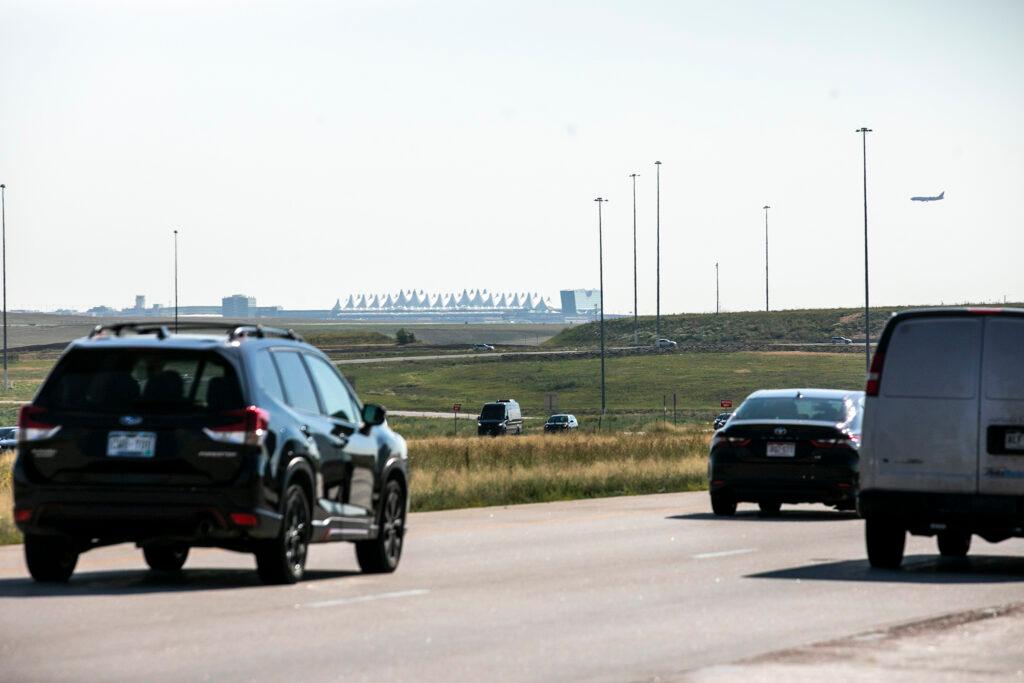
Warner: Now for how people get to and from the airport. Two primary options, Peña Boulevard and the “Train to the Plane.” There's talk of expanding Peña, which our transportation reporter, Nathaniel Minor, has a question about. He recorded this before motoring off to the Midwest for Christmas.
Nathaniel Minor: Governor Jared Polis recently announced new goals of nearly doubling transit service and ridership across the state over the next decade. He's also limiting new highway expansions. So is your desire to expand Peña Boulevard out of step with the state's priorities?
Washington: Well, let me just say we have made no decision on Peña. We are required to do what's called a National Environmental Policy Act (NEPA) process, and then after that process is done, we will end up with what's called a Locally Preferred Alternative. So no decision has been made on Peña. I will say that as part of our Transportation Demand Management (TDM) plan, we came up with 20 recommendations, which sort of center around improving transit. And it's not just the A Line (train). The A Line is one thing, but the state has implemented the new Bustang service from other parts of the state and RTD has bumped up their bus service as well. But we have made no decision. We will do that once this NEPA process is complete.
Warner: Okay. No decision you say on Peña, but you told Denverite in August of 2023 that you wanted a “very responsible expansion of Peña Boulevard.” So are you backing away from that statement?
Washington: Oh no. No, no, no. That is consistent with what I'm saying right now. If we have a result of a Locally Preferred Alternative that talks about expansion, then we want to do that responsibly. If we look at the recommendations on the Transportation Demand Management plan for the A Line, we want to do that responsibly in partnership with RTD as well. So whatever we do, we want to do it responsibly.
Warner: Let me unpack a little of the lingo here. So you talk about Locally Preferred Alternatives. Whose preference? So the NEPA process happens and that's like an environmental thing. Then you've got these Locally Preferred Alternatives. Who's the decider?
Washington: Well, it's a combination of many, many things, but mostly input from the community. Listening to the community, we are bringing on a consultant to help us with that, but listening to the community, listening to many of the recommendations that come out of that process will lead us to what's called a Record of Decision that will be issued by the federal government. And so we will abide by that, but we do not want to predetermine things that will happen on Peña and we're not doing that. But in the meantime, we're looking to improve through these 20 recommendations, transit and the roadways as well.
Warner: So Nathaniel Minor, our transportation reporter, also reports that DEN collected nearly $230 million in parking fees last year, another $95 million in rental car fees. And I think that's more than 30 percent of your revenue. So, Phil Washington, does all of that money associated with car trips perhaps influence a particular desire to widen Peña Boulevard to encourage driving? Is the airport somewhat addicted to car travel because of the revenue it brings?
Washington: Not at all. Not at all. The revenue that we generate from the things that you just listed, yes, that is happening. We need that revenue, obviously. But it will not skew the NEPA process in any way. That is an independent process that we will do with the help, as I mentioned, of consultants and others and we will get to a Record of Decision and a preferred alternative.
Warner: I'm still struggling with the decision-making related to widening a road. Certainly, you have some power here. It's not just the federal government that says yay or nay?
Washington: No, I think it's a combination of things. And when we talk about the federal government, the NEPA process, if I had to assign a percentage to the community input, it would be quite a bit that goes into what we do in terms of an alternative. And so it's not just the federal government telling us what to do, this is very much a local decision when we think about it, and that's why it's called the Locally Preferred Alternative. It's very much that the federal government with the Record of Decision merely validates what came out of the NEPA process and formalizes that in a way.
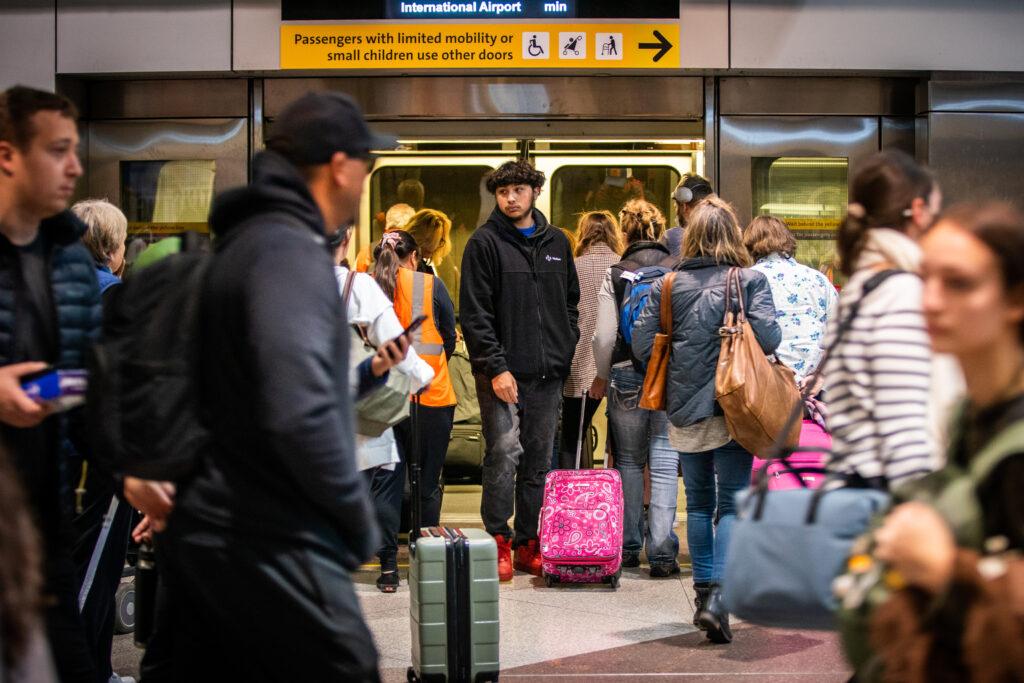
Warner: All right. So, Phil, the airport continues to look for a backup to those underground trains between the terminal and concourses. There are new train cars, but the system just isn't redundant. One rendering I saw had these gangly walkways from (concourses) A to B to C. What's the latest on the thinking there?
Washington: Well, first of all, let me mention that we do have new cars that are coming. We have, I think, 10 that are in-house right now. We are commissioning those new cars. At the end of the day, we will have 41 new train cars. And so that is a great thing.
Warner: Will they be more reliable?
Washington: Yes, more reliable, brand new. If you've been out to the airport, you may have ridden some of the new ones. They're beautiful and definitely more reliable.
In terms of redundancy, a couple of years ago, I think you know that we put out a Request For Information (RFI) to the private sector to say, "Hey listen, bring us your ideas on redundancy for the trains to the concourses." We got some great ideas. You mentioned the gangly tunnels. To me, being from the south side of Chicago, they look too much like alleys, dark alleys. But we are still evaluating the things that were submitted to us by the private sector and we are thinking very seriously on how we can not just provide redundancy, but provide a really good customer experience between the concourses itself.
Warner: I think you and I spoke about a year ago when you were reviewing those. What's the time horizon on the redundancy?
Washington: I think that we will begin to talk about some ideas early in the new year.
Warner: Baggage claim still feels chopped up with construction. What's the update on the so-called Great Hall in general?
Washington: Well, I'm happy to say that the construction is going very, very well. We are under budget and ahead of schedule with the construction. I'll start with the Great Hall. We opened up the West security checkpoint last February. We are on track to open up the East security checkpoint in July, August of next year. That is tracking ahead of schedule and below budget. We will then begin to work on the south end of the airport and we anticipate that going very, very well as well. The great thing here is we are winding down construction in the Great Hall. We recognize that there might be some construction fatigue out there, but we're winding that customer-facing construction impacts, we are winding that down and we're very, very happy for that. And lastly, I would say, we will begin to (share on social media) in the first quarter of next year what the entire Great Hall, the terminal, will look like when complete. And I think people will be very, very pleased. A Colorado-centric terminal with entertainment with top-end concessions. But we are winding this thing down.
Warner: And those, the concessions, you call it a Colorado experience, will they be on the security side?
Washington: That will be pre-security.
Warner: Pre-security. All right. So this is potentially an experience all can enjoy, ticketless or not?
Washington: Absolutely.
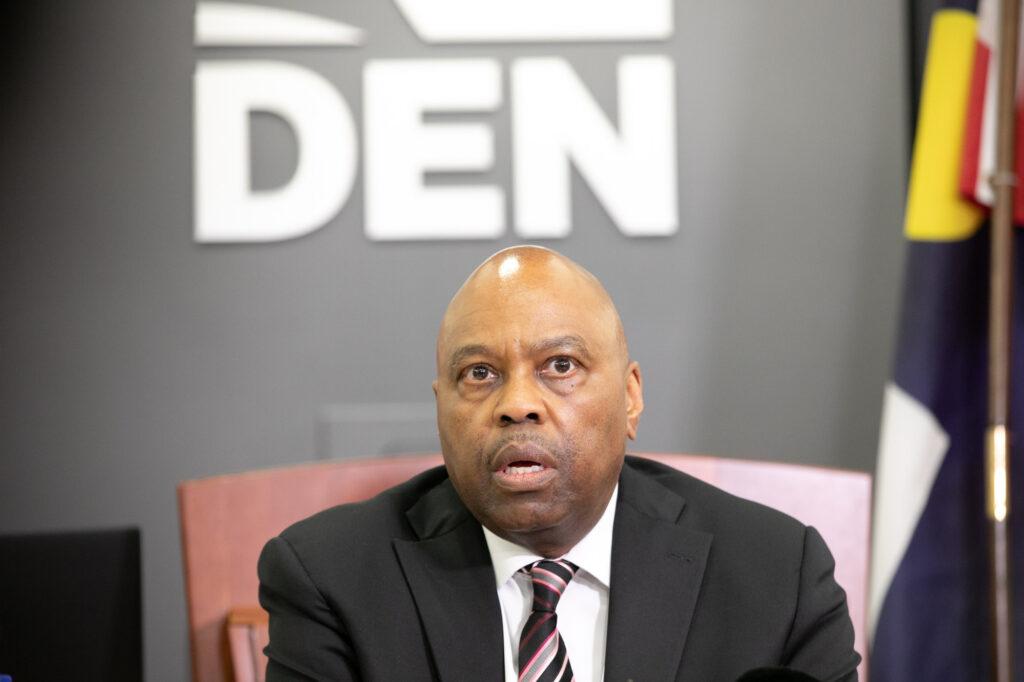
Warner: How do you think the incoming Trump administration will change things, if at all, for the airport, federal support, etc.?
Washington: Listen, we are looking to work with any administration there is. We are an important cog in the national airspace. We are the third-busiest airport in this country, the fifth- or sixth-busiest airport in the entire world. And so we don't typically worry about who comes through our airport. There are all parties, all ethnicities. We work with anybody. And so I anticipate that we will have a productive working relationship with the incoming administration as well.
Warner: Phil Washington, you were once nominated to serve as FAA administrator under President Biden and later withdrew. I'm curious if there's someone you hope Trump would pick for the role?
Washington: No. Again, we will work with anyone. I think transportation and travel is bipartisan. It always has been and my hope is that it always will be. But we're willing to work with anyone. I don't have a preference.
Warner: Transportation and transit is bipartisan perhaps, but federal investment may not be. So do you not have concerns in that regard?
Washington: Obviously we need federal dollars. We use federal dollars here, just like any other large hub airport. But we will state our case. We will state our case that without investment in Denver International Airport, it is a big cog in the national airspace. Without that, there's a big hole in the national airspace if we don't get that investment. So we will continue to work, we will continue to state our case and we'll see where we land. I think we'll do okay.
Warner: Earlier this year I attended a kind of job fair/“Shark Tank” hybrid. Small business owners were trying to land their products at Denver International Airport. Why don't we listen to a snippet?
Kahlea Qualls: “Good morning. My name is Kahlea Qualls, founder and CEO of SHÉ, Specialized Healthy Eats. We are a healthy, affordable, flavorful meal prep service in the Denver metro area.”
Ryan Warner: “What have you brought today to wow the vendors?”
Qualls: “We have our vegan chocolate chip cookies and our vegan brownies made with fruits and vegetables and agave to sweeten. We don't use any sugar.”
Warner: “And how did you come to make products like this?
Qualls: “My father's a diabetic and I am an athlete. I do a lot of pacing for the state of Colorado, so it's very important that we eat healthy and clean. And so a few years back I took a leave of absence to check on my father and to care for him and to help him get back on the right track to healthy eating. And so I just discovered that in the stores there were no meals that were low in sodium and that offered good carbs. So from there was produced and birthed, SHÉ, Specialized Healthy Eats.
Warner: “How is he doing?”
Qualls: “He's doing a lot better. Yes, thank God. Thank you so much for asking.”
Warner: This same event, I met floral vendors, the creators of a travel wallet that goes on your wrist, twins who bake cookies. And meanwhile, it seems like every day a Denver restaurant concept is opening at the airport. I was just looking through the directory. Aviano Coffee, Bar Dough, Breckenridge Brewery, ChoLon, Root Down. Does the flying public care about local brands or do they just crave a Cinnabon?
Washington: I think they care about local brands. When people come through this airport, local brands are really appreciated. And I don't just say that just for Denver International Airport. When I go to other airports, I think about where I'm at and what food is unique to that specific area. So I think there's a great appreciation for that. When you look at how many people are coming through this airport and when you look at how the airport was built and designed for 50 million (passengers) and we're at 82 million, that's where we'll end up at the end of 2024, on our way to 100 million, the unique food choices are very, very important. We are still under-concessioned in a way when you think about the numbers that we have. We actually need more concessions. And so space becomes a challenge for us as we think about the need for more concessions.
Warner: It occurs to me that with the decline of malls, of shopping malls, there are very few places where you get that kind of traffic in a concentrated space. Denver seems to be very aware of the economic power it has at its airport and that there's a certain part of perhaps your mission to leverage that on behalf of small business. Do you think that's true?
Washington: Yeah, I would agree with that, Ryan. We have promoted small businesses out here at the airport. Not just concessions, but small construction companies, small design firms, maintenance firms, folks that do maintenance out at the airport. We have promoted that. We have done a number of small business set-asides. There are more small businesses in this country than any other size business. And so that becomes very, very important for us. I think small business is the lifeblood of this country and it's definitely the lifeblood of Denver International Airport. So we will continue to support those small businesses. We will continue to help them survive and we're proud of that.
Warner: Before we go, a fascinating piece in the New York Times in November, headlined, "Airlines are padding flight times. It's not your imagination. Flying in America has become slower, even as official statistics have shown improvement." From deeper in the article, "The percentage of very delayed flights has increased. Whether we use 90 minutes or three hours as a cutoff, the number of meaningfully late flights is likely to set a record this year." What, if any, power do airports have here?
Washington: Well, I think we have a lot of power in this. Obviously the airlines make their own calls on whether they're on time or delayed. Weather is a big factor as well. But from our standpoint, we want to streamline various things. We want to make it easier for passengers to come through. When we think about the travel journey, we start at someone's home. You're leaving that house, your home, how long does it take you to get through Peña Boulevard, which we've talked about. How long does it take for you to get through security and then the train? So that travel journey is from when you leave your house till you're sitting on that plane. And so for our part, we want to make it just incredibly easy from the airport side for you to be able to do all those things and get to your destination.
Warner: Are you saying that flights are delayed mostly because of passengers?
Washington: No, not at all. Not at all. I think that it's incumbent upon us to do the things that I just mentioned within the airport, but obviously weather has a lot to do with it. We do a great job of clearing snow from the runway. I think we have the best snow team in the entire world in terms of keeping runways clean. So we're doing our part to streamline the process.
Warner: And is there any lobbying that an airport can do when it comes to flight times and whether they're on time?
Washington: We meet with our airline partners. I probably talk to the airlines out here every day. And so when we find out if the slowdown is due to something that's happening in the airport, whether it's the train to the concourses or security or whatever it is, we work to alleviate that. But we advocate all the time. We have a big ecosystem out here with 40,000 plus employees. So whatever we can do to make things better, we do.
Warner: Do you say DEN or DIA, Phil?
Washington: I say Denver International Airport.
Warner: Oh boy. That's a politician's answer. You're not going to go DEN or DIA. Okay, thank you, Phil. Happy Holidays to you.
Washington: Happy Holidays, Ryan.
Warner: I hope it's smooth going there. Phil Washington leads Denver International Airport.
